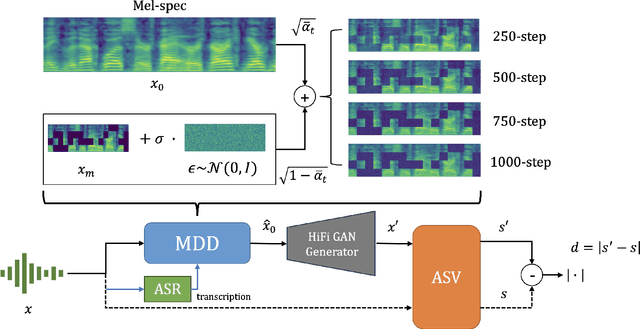Yibo Bai
MDD: a Mask Diffusion Detector to Protect Speaker Verification Systems from Adversarial Perturbations
Aug 26, 2025



Abstract:Speaker verification systems are increasingly deployed in security-sensitive applications but remain highly vulnerable to adversarial perturbations. In this work, we propose the Mask Diffusion Detector (MDD), a novel adversarial detection and purification framework based on a \textit{text-conditioned masked diffusion model}. During training, MDD applies partial masking to Mel-spectrograms and progressively adds noise through a forward diffusion process, simulating the degradation of clean speech features. A reverse process then reconstructs the clean representation conditioned on the input transcription. Unlike prior approaches, MDD does not require adversarial examples or large-scale pretraining. Experimental results show that MDD achieves strong adversarial detection performance and outperforms prior state-of-the-art methods, including both diffusion-based and neural codec-based approaches. Furthermore, MDD effectively purifies adversarially-manipulated speech, restoring speaker verification performance to levels close to those observed under clean conditions. These findings demonstrate the potential of diffusion-based masking strategies for secure and reliable speaker verification systems.
Diffusion-Based Adversarial Purification for Speaker Verification
Oct 24, 2023



Abstract:Recently, automatic speaker verification (ASV) based on deep learning is easily contaminated by adversarial attacks, which is a new type of attack that injects imperceptible perturbations to audio signals so as to make ASV produce wrong decisions. This poses a significant threat to the security and reliability of ASV systems. To address this issue, we propose a Diffusion-Based Adversarial Purification (DAP) method that enhances the robustness of ASV systems against such adversarial attacks. Our method leverages a conditional denoising diffusion probabilistic model to effectively purify the adversarial examples and mitigate the impact of perturbations. DAP first introduces controlled noise into adversarial examples, and then performs a reverse denoising process to reconstruct clean audio. Experimental results demonstrate the efficacy of the proposed DAP in enhancing the security of ASV and meanwhile minimizing the distortion of the purified audio signals.
 Add to Chrome
Add to Chrome Add to Firefox
Add to Firefox Add to Edge
Add to Edge